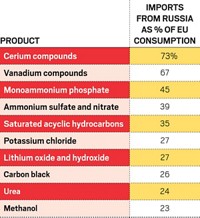Advertisement
Grab your lab coat. Let's get started
Welcome!
Welcome!
Create an account below to get 6 C&EN articles per month, receive newsletters and more - all free.
It seems this is your first time logging in online. Please enter the following information to continue.
As an ACS member you automatically get access to this site. All we need is few more details to create your reading experience.
Not you? Sign in with a different account.
Not you? Sign in with a different account.
ERROR 1
ERROR 1
ERROR 2
ERROR 2
ERROR 2
ERROR 2
ERROR 2
Password and Confirm password must match.
If you have an ACS member number, please enter it here so we can link this account to your membership. (optional)
ERROR 2
ACS values your privacy. By submitting your information, you are gaining access to C&EN and subscribing to our weekly newsletter. We use the information you provide to make your reading experience better, and we will never sell your data to third party members.
Environment
Electronic Waste Transformation
African nations seek shift to clean recycling that creates jobs, supplies rare earths
by Cheryl Hogue
April 2, 2012
| A version of this story appeared in
Volume 90, Issue 14

For years, African countries have been a dumping ground for outdated electronic equipment, mainly from Europe. Now, rapidly expanding use of computers and mobile phones within Africa is generating more electronic waste—or e-waste—than is imported, according to the United Nations.
African countries, however, are seeking to make a silk purse out of the sow’s ear that is their e-waste problem. At a meeting convened in Nairobi, Kenya, last month by the UN Environment Program (UNEP) with support from several electronics manufacturers, 18 African governments endorsed a strategy. They intend to transform informal material-recovery efforts into a regulated recycling industry that generates economic development and controls pollution.
Most African countries currently lack appropriate recycling facilities for e-waste. Instead, entrepreneurial individuals and small businesses recover valuable metals such as copper from obsolete equipment through activities such as burning. These recovery efforts contaminate water, air, and soil with toxic materials, including mercury, lead, and other pollutants.
“It is now the time for Africa to take action on addressing health and environmental problems as a result of current recycling practices, while creating jobs and business opportunities and alleviating poverty,” said Ali D. Mohamed, permanent secretary of Kenya’s Ministry of Environment & Mineral Resources.
UN officials see good potential for African countries to develop a regulated recycling industry that would sell materials that are in international demand.
For instance, the demand for rare-earth metals, which are crucial components of cutting-edge technologies such as lasers and hybrid-electric cars, is rising (Environ. Sci. Technol., DOI: 10.1021/es203518d; see page 14). Meanwhile, China, which supplies 90% of the rare earths on the market, has restricted exports of newly minted materials. However, the rate of recovery of rare earths from e-waste is low, UNEP Executive Director Achim Steiner pointed out.
There are precious metals in e-waste too. “One ton of obsolete mobile phones contains more gold than one ton of ore,” said Katharina Kummer Peiry, executive secretary of the Basel Convention, a treaty controlling international shipments of hazardous waste.
Given the value of materials such as gold and rare earths, “there are recyclers and other industrial sectors who are interested in taking advantage of such opportunities,” Peiry said.
Computer maker Hewlett-Packard has been working on e-waste issues in several African countries and, in 2011, opened an electronics recycling facility in Kenya, a company representative told C&EN. HP was one of four electronics manufacturers that provided financial support for the UNEP conference.
Steiner is optimistic about the opportunity at hand. “The future of cleantech, high-tech products and the transition to a green economy,” he said, “may in part depend on boosting the recycling of e-waste to ensure a steady and streamlined supply of these specialty metals.”




Join the conversation
Contact the reporter
Submit a Letter to the Editor for publication
Engage with us on Twitter